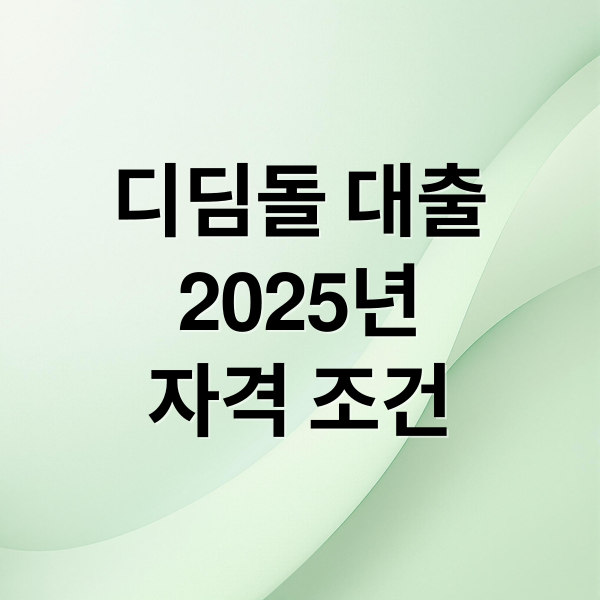
The 2025 Didimdol Loan is one of Korea’s most important government-backed mortgage programs, created to help first-time buyers and no-home households achieve homeownership. With relaxed income and housing price requirements, more families are now eligible. In this complete guide, we’ll cover eligibility criteria, interest rates, loan limits, application steps, repayment methods, and tips so you can take full advantage of this program.
What is the Didimdol Loan?

The Didimdol Loan is a government-supported housing mortgage designed for no-home households. In 2025, requirements have been eased — annual household income ≤ KRW 70 million and property prices ≤ KRW 600 million.
Special Benefits for Newlyweds
Couples married within 7 years can borrow at lower interest rates and higher limits. The Newborn Special Loan allows up to KRW 400 million with LTV up to 80% for first-time buyers.
Key Advantages
✔ Lower rates than commercial banks (2–3%) ✔ Higher loan limits ✔ Easier DTI requirements This makes it possible for more households to qualify for a home mortgage.
Didimdol Loan Eligibility (2025)

General requirements: - Household annual income ≤ KRW 130 million - Net assets ≤ KRW 488 million - Property price ≤ KRW 900 million - Property size ≤ 85㎡
Additional Conditions for Newlyweds
✔ Married within 7 years (or engaged within 3 months) ✔ Combined income ≤ KRW 85 million ✔ Net assets ≤ KRW 488 million ⚠️ Note: From June 28, 2025, loan limits and LTV ratios will be adjusted.
Didimdol Loan Interest Rates & Limits (2025)

Loan amounts:
- General applicants: up to KRW 200M
- Newlyweds: up to KRW 320M
- First-time buyers: up to KRW 240M
- Newborn special: up to KRW 400M
Interest rates: 2.15% – 4.50%
Income-Based Rate System
- Income ≤ KRW 20M → 2.55% - Income ≤ KRW 40M → 2.9% - Income ≤ KRW 70M → 3.25% - Income ≤ KRW 85M → 3.6% 💡 Non-capital regions receive 0.2%p lower rates.
Special Discounts
Families with 2+ children, eco-friendly homes, and electronic contracts may qualify for rates in the 1% range. Prepayment penalties are waived from Aug 12, 2024 to Dec 31, 2025.
How to Apply for the Didimdol Loan

You can apply through banks with documents such as your purchase contract, income statements, and resident registration. For full details, visit the Korea Housing Finance Corporation or check with your bank.
Application for Newlyweds
Applications can be made via the e-Dundun portal or bank branches. Required docs: Marriage certificate, income certificate, employment certificate, purchase contract. Processing time: 2–3 weeks.
Important Notes
✔ All assets must be disclosed ✔ Hidden wealth or false documents = disqualification ✔ Must remain no-home status until approval ✔ Compare multiple banks for fees & services
Didimdol Loan Repayment Options

Repayment plans include: - Equal Principal & Interest: fixed monthly payments, higher total interest - Equal Principal: decreasing payments over time - Graduated Repayment: lighter early payments, heavier later
Terms available: 10, 15, 20, 30 years.
Prepayment Rules
✔ No penalty Aug 2024 – Dec 2025 ✔ Prepayment within 3 years may incur 1.2% fee ✔ Must move in within 1 month of loan execution
Tips for Maximizing the Didimdol Loan

✔ Use the loan calculator at the Korea Housing Fund site ✔ Prepare income/employment docs in advance ✔ Processing takes 1–2 weeks, apply early
Changes in June 2025
From June 28, 2025, loan limits and LTV ratios will change. Plan your mortgage application before the new rules apply.
Didimdol Loan vs Other Mortgages

- Didimdol Loan: Low rates, stricter requirements - Bogeumjari Loan: Higher property limit, higher rates, easier screening - First-Time Buyer Mortgage: Combines benefits of both
Conclusion

The 2025 Didimdol Loan is a stepping stone for achieving your dream home in Korea. With relaxed eligibility, lower rates, and easier applications, more households can benefit. Plan carefully and take advantage of this opportunity to secure your future.
Frequently Asked Questions (FAQ)
1. What is the Didimdol Loan?
A government-backed mortgage that helps no-home households in Korea purchase their first home.
2. What changed in 2025?
Expanded income & housing price requirements so more people qualify.
3. How are interest rates decided?
Rates vary by income. Lower income = lower rate benefits.
4. What documents are required?
Marriage certificate, income certificate, employment certificate, purchase contract.
5. What repayment options are available?
Equal principal & interest, equal principal, graduated repayment — each with pros & cons.

0 댓글